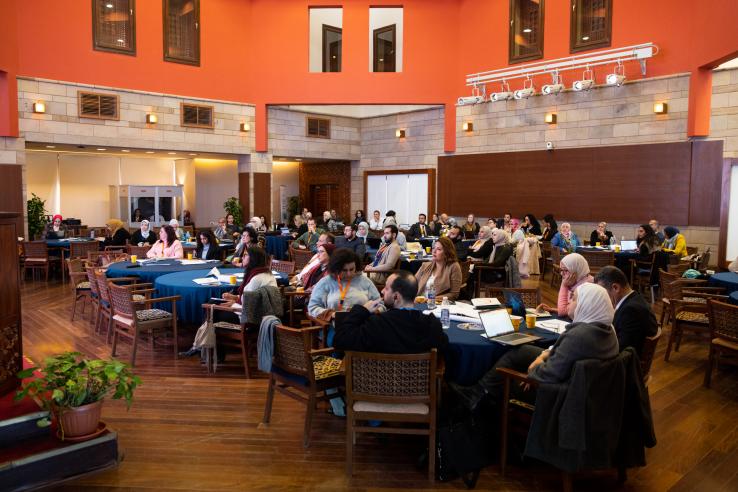J-PAL MENA 2024 Evaluating Social Programs Course: Egypt Impact Lab

Invitation Only
This course is hosted by J-PAL MENA at the American University in Cairo (AUC) and the Egypt Impact Lab (EIL), an embedded lab in the Ministry of Planning and Economic Development.
This is an invitation-only course, tailored to the needs of professionals who are considering, planning, or currently conducting randomized evaluations under the EIL.
Overview and Objectives
The second annual EIL Evaluating Social Programs will take place from 15–17 January 2024 at AUC. This three-day, in-person training course equips participants with resources and knowledge to engage with impact evaluations of social programs. The course provides an in-depth look at why and when randomized evaluations can be used to rigorously measure social impact, methods and considerations for their design and implementation, and how findings can inform evidence-based policies and programs.
The course is tailored to the needs of EIL strategic government partners, and the practitioners from NGOs, international organizations, and foundations with whom they work. The course targets current or potential partners exploring designing randomized evaluations for government innovations under EIL’s three thematic areas: social protection and poverty alleviation; employment and micro, small, and medium enterprise development; and family development and female empowerment.
This round of the ESP course is also organized in anticipation of the launch of J-PAL MENA’s Air and Water Lab, which aims to facilitate collaborations between government partners and researchers to innovate, test, and scale evidence-informed air and water policies.
Participants who attend the course will:
- Gain a clear understanding of why and when researchers and policymakers might choose to conduct randomized evaluations and how randomized evaluations are designed in real-world settings;
- Engage with experienced J-PAL affiliated professors and staff on how to generate rigorous evidence to inform decision-making;
- Participate in small group exercises to work through lecture content and case studies with J-PAL staff members who have expertise in the design and implementation of randomized evaluations;
- Work through the design of a new randomized evaluation of programs implemented by participants’ organizations.
The EIL is made possible with support from founding partners Sawiris Foundation for Social Development and Community Jameel, with additional support from UNICEF Egypt.
Key Concepts Covered
Participants will be introduced to the following key concepts and topics throughout the course:
- Why and when a rigorous evaluation of social impact is needed.
- Key components of a high-quality randomized evaluation design
- Foundational tools like needs assessments, logical frameworks, and theories of change.
- Techniques for incorporating randomized evaluation into existing project designs.
- How to determine an appropriate sample size and measure outcomes
- Techniques for data analysis and interpretation of results.
- Strategies to maximize policy impact and assess the generalizability of research designs.
- Frameworks to understand and apply the results of prior randomized evaluations to your program.
Tentative Agenda
| Time | Monday, January 15 | Tuesday, January 16 | Wednesday, January 17 |
|---|---|---|---|
| 8:45–9:00 AM | Registration | ||
| 9:00–10:30 AM | Welcome remarks Lecture 1: Why Evaluate and Why Randomize Dr. Ahmed Sayed |
Lecture 3: How to Randomize | Lecture 6: Generalizability and Evidence Use |
| 10:30–11:00 AM | Coffee break | ||
| 11:00 AM–12:00 PM | Case Study 1: Why Randomize | Case Study 3: How to Randomze | Project Group Work |
| 12:00–1:30 PM | Lecture 2: Theory of Change and Measurement | Lecture 4: Sample Size and Power | Lecture 7: Randomized Evaluations Start to Now: Bab Amal |
| 1:30–2:30 PM | Lunch | ||
| 2:30–3:15 PM | Case Study 2: Theory of Change and Measurement | Project Group Work | Group Presentations |
| 3:15–3:30 PM | Break | ||
| 3:30–5:00 PM | Project Group Work | Lecture 5: Ethics of Randomized Evaluations | Group Presentations Closing Remarks |
Location: Moataz AlAlfi Hall, The American University in Cairo, AUC Avenue, Fifth Settlement, New Cairo, Egypt
For directions, please navigate to this location (Enter through AUC Gate 4, Pepsi Gate, then follow directions to Moataz AlAlfi Hall).
Contact: Please reach out to Waleed Eldeeb (weldeeb@povertyactionlab.org) with questions about the course.